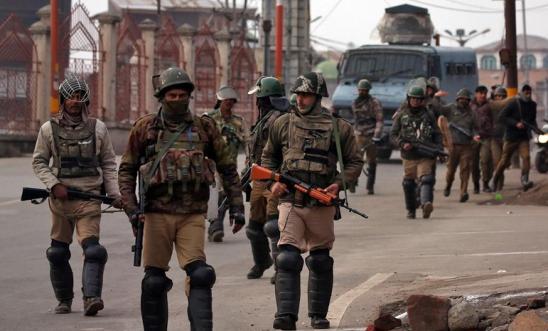
NOBODY KNOWS WHAT’S HAPPENING IN KASHMIR

Written by Cherry Bird (Country Coordinator for India) with Mysha
Mysha* hasn’t seen her husband for four years. He left their home in Kashmir in 2019, the year of the abrogation of article 370, when Kashmir’s status as India’s only Muslim majority state was removed, downgrading it to two union territories ruled directly from Delhi. For more information about this see Amnesty International’s report We are Being Punished by the Law here. He knew that as a prominent journalist and advocate for human rights, he would be a target, placed on the Indian government’s list of journalists and activists to be watched. The list is divided into categories, by an obscure set of criteria, with anyone in category 1 subject to the most severe restrictions, including being prevented from travelling or working and constantly watched, both physically (shadowy figures glimpsed around corners) and online. He and Mysha therefore agreed he should leave while he could. It seems he was wise. At least 98 journalists and activists have had their passports cancelled just this year, so they are now unable to leave Kashmir. Some unconfirmed reports say this could be as many as 200, but no explanations are available as to who appears on the list for suspension and why.
Mysha stayed, keeping below the radar by officially working for a charity focusing only on women’s rights, although their office has now been forced to close, along with many other local NGO and media houses. All the while she continued to quietly gather information, writing and producing videos of human rights violations. None of the media houses dared publish this work, which has left her deeply frustrated, as well as traumatised by what she witnessed. She said she has “so many stories” of things that have happened to people - many “killing stories” she added, and reports of houses burned during the night. When her office closed, she and others like her hid their materials in bathrooms at home. She wants these stories and materials to be widely shared, so there is better understanding of the relentless destruction taking place as India ratchets up control of people’s lives and thoughts in Kashmir.
Earlier this year she began to notice warning signs for herself, official visits to her house, cameras broken, strangers seen near the house, and realised she could be next in line for further restrictions, so she too left. Her experiences over the past few years have left their mark. She is clearly very emotionally disturbed and receiving trauma counselling support. The mental health consequences of the situation are profound and widespread. Mysha said that many Kashmiris are psychologically disturbed and anxious, and stay indoors as much as possible. Generally, the people seen moving around the streets are “outsiders” (ie non-Kashmiris who have moved in).
Many people have been arrested and questioned at police stations, sometimes whole families, including children. Those who are detained in prison, often without formal charges, are usually sent outside to Indian jails, making it hard or impossible for families and friends to visit them. Security checks are everywhere. Even social media activity is tracked, with anything deemed “anti-national” being blocked and pictures deleted. Everything is controlled. People are now too repressed to do anything. Even Kashmiris outside the country or in other Indian states are tracked and if they overstep some invisible line their families in Kashmir may pay the price. For example, a Kashmiri journalist in USA shared something critical of the Indian government online and his family were immediately taken in for questioning.
The economic situation is very bad for most people, despite outward signs of “development”, such as upgraded roads and new buildings, which the Indian government highlights as evidence of “improving lives for Kashmiris”. But that is not what Kashmiris want, Mysha says. Unemployment is high. Traditionally many families had orchards from which they exported apples in September as a source of income, but the trucks are often stopped at the border and delayed long enough for the fruit to spoil. Many orchards have also been burned and trees cut down. The prevailing sense of hopelessness has led to significantly increased drug use, especially among young people, and addiction levels are rising. Doctors at the Institute of Mental Health and Neurosciences in Srinagar say the number of addiction cases they are seeing has risen “alarmingly” from around 10 to 15 per day to 150 to 200, and this is only those who go for help. See BBC report here. Suicide among young people is also increasing. “Nothing is normal” Mysha concluded.
To learn more about Amnesty International UK’s Activist Led Campaign on Kashmir, contact us on kashmircampaign@amnesty.org.uk to join the supporter network and receive regular updates.
*Name changed for security reasons
Our blogs are written by Amnesty International staff, volunteers and other interested individuals, to encourage debate around human rights issues. They do not necessarily represent the views of Amnesty International.
0 comments